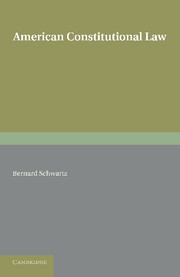Book contents
- Frontmatter
- Dedication
- Contents
- Foreword
- Preface
- PART I THE STRUCTURE
- Chapter I The Bases of the American System
- Chapter II The Federal System
- Chapter III The Congress
- Chapter IV The President
- Chapter V The Courts
- PART II MODERN DEVELOPMENTS
- Appendix: Constitution of the United States of America
- Index of Cases
- General Index
Chapter III - The Congress
from PART I - THE STRUCTURE
Published online by Cambridge University Press: 05 June 2016
- Frontmatter
- Dedication
- Contents
- Foreword
- Preface
- PART I THE STRUCTURE
- Chapter I The Bases of the American System
- Chapter II The Federal System
- Chapter III The Congress
- Chapter IV The President
- Chapter V The Courts
- PART II MODERN DEVELOPMENTS
- Appendix: Constitution of the United States of America
- Index of Cases
- General Index
Summary
‘The power and jurisdiction of Parliament, says Sir Edward Coke, is so transcendent and absolute, that it cannot be confined, either for causes or persons within any bounds.’ This doctrine of parliamentary supremacy is the dominant characteristic of British political institutions. Under it, according to the almost proverbial English aphorism, ‘Parliament can do everything but make a woman a man, and a man a woman’. It is its sovereign position in this respect that sharply differentiates the legislature in Britain from its counterpart in the United States. The existence of a written constitution in that country, whose provisions are enforced by the courts, has prevented the American Congress from asserting for itself anything like the supreme status assumed by its counterpart in Britain. Like the other organs of the Federal Government, the Congress possesses only the powers expressly or impliedly granted to it by the Constitution. And, if it acts beyond the terms of the grant in the fundamental law, its acts will be set aside by the American courts as ultra vires and unconstitutional.
Yet, though the American legislature is not sovereign in the British sense, its position in the federal governmental structure should not be minimized. To the Congress is delegated all of the legislative power conferred by the American Constitution. The very first section of Article I of that instrument provides that ‘All legislative Powers herein granted shall be vested in a Congress of the United States, which shall consist of a Senate and House of Representatives’. Because of the doctrine of the separation of powers, which, as we have seen, has been of such significance in the American system, this means that the Congress alone is the source of all federal legislation. Although, under modern constitutional theory, the executive, too, may exercise authority which is legislative in character, its powers in this respect are entirely subordinate ones. They must find their source in delegations from the Congress, or else they cannot validly be exercised.
It is hardly necessary to impress upon the modern jurist the importance of a governmental organ, like the American Congress, which is the source of all legislative authority.
- Type
- Chapter
- Information
- American Constitutional Law , pp. 49 - 84Publisher: Cambridge University PressPrint publication year: 2013

